Use The Right Format To Submit Music To Blogs, Radio, Festivals And More
Getting the attention of music blogs, DJs, and licensing agencies etc. is a tricky business, as each one requires a special approach. Here Michael Corcoran helps explain the best way to pitch your music to various different entities within the music business.
____________________________
Guest post by Michael Corcoran on DIY Musician
Many artists write to ask me how they can get their songs to blogs, DJs, and music companies without breaking the band promo budget. I get it; band budgets are tight and you want to save everywhere you can. You’re willing to put in the time & energy to reach out and follow up with radio stations, music blogs, and labels on your own.
Maybe you’ve read this article by David Wimble (the Indie Bible) advising how to contact music sites. It’s a long read but contains crucially important information, and so I’ve taken the liberty of breaking it down into general guidelines, with an easy-to-reference graphic. Keep in mind, you’ll still want to check with each individual website for the specific instructions before submitting – but the graphic should help you with the basics.
And, of course if you wear yourself out doing all this muckwork, re-check the band fund for spare change and use one of these submission services. They’re much better today than the earlier years of internet music promotion, and pricing usually start at under $15. Okay, Back to DIY!
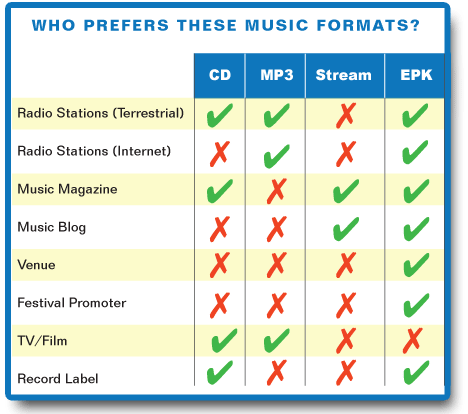
First Universal rule: Remember this! Never attach an MP3 file to in email unless specifically asked to. Instead, use a download link to your mp3 that also streams the music, like Dropbox or Box.com.
Second Universal Rule: With very few exceptions, sites will almost always accept a streaming link of your music at first. Streams are most convenient for screening your music. However, streams are not always that last step. Many types of sites will need more than just a stream, as you’ll find below & in the graphic.
Use these guidelines for submitting music, depending on What Type of Music Company you are sending to.
Radio Stations
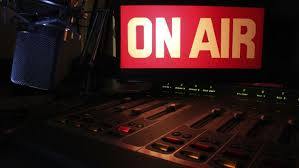
Preferred vehicle: Hardcopy CDs
Might accept: MP3s, EPKs with download links
Can’t use: Streaming links, Videos
Most radio stations have staff working different hours, with no central digital database to store potential music for the air. CDs are much easier to share and pass around at a radio station.
Usually they prefer to screen your music first – so don’t waste a CD on a station that hasn’t heard you yet. A streaming + download link may be acceptable – but to air your music, the station will eventually need your digital file or hardcopy. Be ready to reply and get the station what they ask for.
Webzines & Blogs
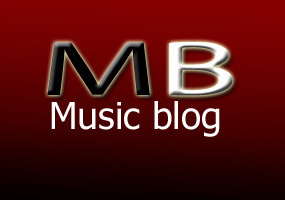
Preferred vehicle: Embeddable music player, Videos
Might accept: CDs, digital press kits
Can’t use: MP3s
Bloggers share music in a different way than DJs; they do it digitally, usually with streaming links. Some webzines that do full album reviews prefer the hardcopy CD, but this is getting rarer.
MP3s are of no use to most bloggers – they don’t have the bandwidth to host a database of MP3s. Streaming links from Soundcloud, Bandcamp, Spotify, and YouTube are so much easier.
Festivals

Preferred vehicle: Digital Press kits
Might accept: CDs, hardcopy press kits
Can’t use: MP3s
Your digital press kits contains your band’s pertinent info: Music, Bio, Photos, Links, Press Release information, Short Description.
A festival will need to learn a lot about your band before considering you for a slot. Basically, they need every piece of music marketing material you have.
Record Labels/Producers
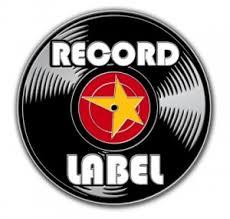
Preferred method: CDs or press kits
Might accept: Video or streaming links
Can’t use: MP3s
Labels generally prefer to listen to your music first, then request more material if they like you.
It’s best to send your streaming music, then wait. Be ready to send a Hardcopy CD + press kit, or a digital press kit. MP3s aren’t useful, unless the label loads all their music into iTunes, which they don’t.
Venue/Promoter
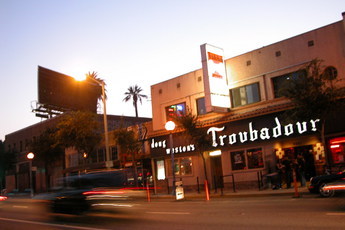
Preferred Method: Digital Press Kit
Might accept: Live Video
Can’t use: Streaming link, MP3s, CDs
For venues, it’s more about your band information you provide rather than the music itself. Don’t waste your hardcopy CDs with a venue owner – save it for the merch table!
TV/Film Sync
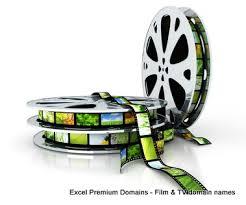
Preferred method: MP3s ( use download link, and properly tagged)
Might accept: Hardcopy CDs, video
Can’t use: Digital press kit
Sync supervisors collect large databases of digital music that they can refer to later. They may use streaming links to weed out the bad stuff, but they’ll still need your fully-tagged digital file for keeping track of who gets paid what in the event of a placement.
Hardcopy CDs may or may not contain the necessary information. A video may be used to judge your “sync-ness.” A digital press kit contains too much irrelevant info for a sync supe.
[This article originally appeared on MusicSubmit.]
Well… really informative post here.
Submitting your music to right place and in right way is really important. Thanks for the info..
Format sometimes creates problems at the point of performance. So it is important to keep the right one. Amazing post..
Thanks for sharing this.